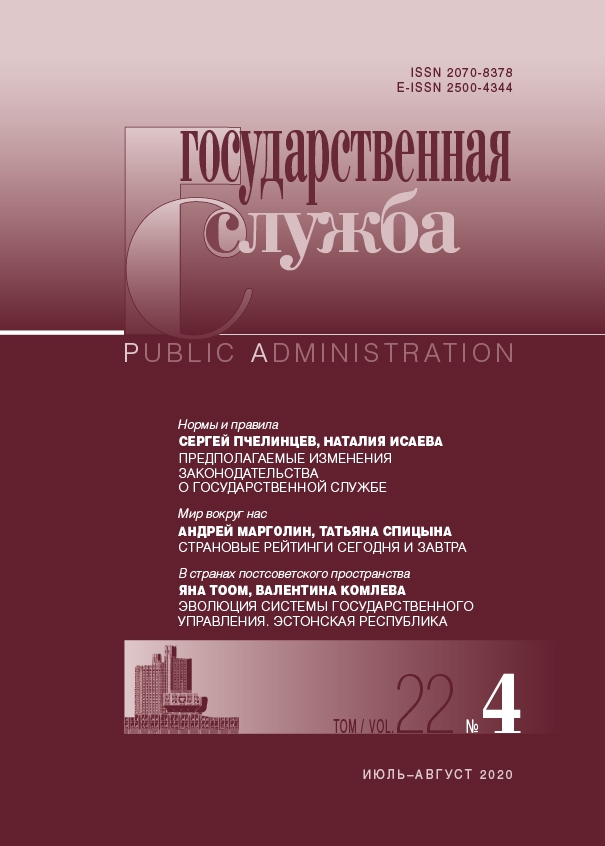Recommended link to article:
MARINA VALERYEVNA KORNILOVAа
аRussian Academy of Sciences
DOI: 10.22394/2070-8378-2020-22-4-65-72
Abstract:
The article examines the work of the “Moscow Longevity” state project/program. The analysis is carried through on the assessments given by the elderly residents of Moscow, as well as specialists from social welfare institutions responsible for the implementation of the program. The program is newly established and has been working in Moscow for over two years. The author names 4 stages for the implementation of the program: preparatory, trial, main, and “special” stages. This staging is based on the existing legal acts regulating the implementation of the project, as well as on the analysis of sociological research. The primary sources of data are: interviews conducted by the author with elderly residents of Moscow regarding the “Moscow Longevity” program (April-May 2020); surveys and focus groups conducted by the author during her work at the Moscow Institute of Additional Professional Training of Social Workers (2016-2017). The article examines statistics and publications in the mass media concerning the success of the “Moscow Longevity” project. Elderly Muscovites and employees of social organizations highly appreciated the ongoing activities, noting their relevance and timeliness, both for involving senior citizens in an active lifestyle and for adapting the elderly to a new period of life “for themselves”. Participants of the program take computer courses, study foreign languages, attend dance lessons, go to sports classes, develop artistic and aesthetic skills, master tourism, and visit cultural sites in Moscow. However, the program also has significant drawbacks, eliminating which requires significant material and technical resources as well as personnel work. Each year the participants voiced the same problems associated with the poor condition of the premises and the lack of an individual approach to activities’ organization. The “special” stage related to the situation with the coronavirus pandemic revealed a lack of computer skills among the program participants (despite the conducted computer classes) and inability to quickly adapt to new conditions.
Keywords:
Moscow longevity, elderly Muscovites, adaptation, social activity, social security, the older generation, isolation
Received:
July 1, 2020
References:
Anikeeva O. A. Old age and active longevity in modern Russia: realities and trends of changes. In: Otechestvennyi zhurnal sotsialnoi raboty. 2018. No. 4. P. 60-72. In Russian
Golubeva E. Yu. Modern directions of scientific and practical research of the policy of active and healthy longevity: experience and perspectives. In: Uspekhi gerontologii, 2015. Vol. 28. No. 4. P. 634- 638. In Russian
Gracheva O. E. New trends in normative legal support for the development of social security in Moscow. In: Sotsiologiya. 2018. No. 3. P. 82-86. In Russian
Isopahkala-Bouret U. Graduation at age 50+: Contested efforts to construct “third age” identities and negotiate cultural age stereotypes. In: Journal of Aging Studies, 2015. Vol. 35. P. 1-9. In English
Kornilova M. V. To the question of the research of the level and quality of life of the elderly: problems and prospects. In: Sotsiologiya i obshchestvo: sotsial’noye neravenstvo i sotsial’naya spravedlivost’ (Yekaterinburg, October 19-21, 2016) [Electronic resource] Materials of the V All-Russian Sociological Congress. Executive editor Mansurov V. A. [Electronic resource] Moscow. Russian Society of Sociologists, 2016. P. 2813-2821. In Russian
Kozlova T. Z. Social time of pensioners: stages of self-realization of the individual. M., 2003. In Russian
Meltem I. Economic and social consequences of population aging: the dilemmas and opportunities in the twenty-first century. In: Applied Research in Quality of Life, 2015. Vol. 10. P. 735-752. In English
Potekhina I. P., Chizhov D. V. Potential of the older generation as a component of national human capital (based on research in the regions of the Central Federal district). In: Monitoring obshchestvennogo mneniya: Ekonomicheskiye i sotsialnyye peremeny, 2016. No. 2. P. 3-23. In Russian
Rogozin D. M. Liberalization of aging, or labor, knowledge and health in older age. In: Sotsiologicheskiy zhurnal. 2012. No. 4. P. 62-93. In Russian
Skinner B. F., Vaughan M. E. Enjoy old age: A practical guide. New York: W.W. Norton & Company Publishing Company, 1997. In English
Articles in Open Access mode are published under the Creative Commons Attribution 4.0 International (CC BY) license.

